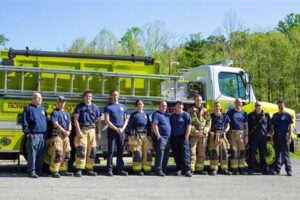Table of Contents
Looking to join a volunteer fire department? Discover the essential requirements you need to meet, including physical fitness, firefighting training, and a commitment to serving the community. Find out how you can make a difference and contribute to public safety by becoming a volunteer firefighter.
Are you passionate about serving your community and saving lives? Do you have a brave and selfless spirit that thrives in the face of danger? If so, then joining a volunteer fire department might be the perfect fit for you. However, before you rush into this noble endeavor, it is important to understand the requirements that come with being a volunteer firefighter. From physical fitness and mental preparedness to specialized training and a commitment to ongoing education, there are several key factors that determine whether you have what it takes to become an integral part of a volunteer fire department.
Introduction
Volunteer fire departments play a crucial role in ensuring the safety and well-being of communities across the country. These dedicated individuals selflessly commit their time and effort to protect lives and property during emergencies. However, becoming a volunteer firefighter is not as simple as just showing up and offering assistance. There are specific requirements that individuals must meet to join a volunteer fire department.
Physical Fitness
One of the most essential requirements for joining a volunteer fire department is having a good level of physical fitness. Firefighting is a physically demanding job that requires individuals to be able to handle strenuous activities such as carrying heavy equipment, climbing ladders, and rescuing individuals from dangerous situations. Prospective volunteers may have to undergo a physical fitness test to ensure they can meet the physical demands of the role.
Age Requirements
The age requirements to join a volunteer fire department can vary depending on the jurisdiction. Generally, individuals must be at least 18 years old to become a volunteer firefighter. However, some departments may have a lower age limit, such as 16 or 17, for junior volunteer programs. It is important to check with the specific department to understand their age requirements.
Education and Training
Volunteer firefighters are required to undergo extensive training to effectively respond to emergencies. This includes both classroom instruction and hands-on practice. The level of education required can vary, but most departments require a high school diploma or equivalent. Additionally, volunteers may need to complete specific firefighting courses and certifications, such as First Aid and CPR training, before joining the department.
Background Checks
Due to the nature of the job, volunteer fire departments often require background checks for prospective members. This is done to ensure the safety of both the community and the department. Background checks typically include criminal history records, driving records, and may also involve interviews with references. Individuals with certain criminal convictions or a history of drug abuse may be disqualified from becoming volunteer firefighters.
Driver’s License
Most volunteer fire departments require individuals to have a valid driver’s license to operate emergency vehicles. This is particularly important for those interested in becoming volunteer firefighters who wish to drive fire trucks. Some departments may also require volunteers to have a clean driving record, ensuring they can safely transport equipment and personnel to emergency scenes.
Residency
Many volunteer fire departments have residency requirements, meaning individuals must live within a certain distance of the fire station or within the department’s jurisdiction. This is to ensure that volunteers can respond quickly to emergencies and be readily available for duty. Residency requirements may vary, so it is essential to check with the specific department to understand their regulations.
Availability and Commitment
Volunteer firefighting is not just a hobby; it requires a significant commitment of time and availability. Fire departments typically expect volunteers to be on-call, ready to respond to emergencies at any time, day or night. This means individuals must have a flexible schedule and be prepared to prioritize their firefighting responsibilities above personal commitments when necessary. Additionally, volunteers are often expected to attend regular drills and training sessions to maintain their skills and knowledge.
Physical Abilities
Besides general physical fitness, individuals interested in becoming volunteer firefighters must have specific physical abilities. This includes good vision and hearing, as well as the ability to handle high-stress situations. Firefighters must also be able to work well in teams and communicate effectively with others during emergencies. These physical abilities are crucial for ensuring the safety of both firefighters and those they are assisting.
Drug Testing
Many volunteer fire departments have drug testing policies in place. This is done to ensure that volunteers are not under the influence of drugs or alcohol while on duty. Drug testing may be conducted during the application process or randomly throughout a volunteer’s tenure. Individuals who fail a drug test are typically disqualified from becoming volunteer firefighters or may face disciplinary action.
Conclusion
Joining a volunteer fire department is a noble and rewarding endeavor, but it comes with certain requirements and responsibilities. Prospective volunteers must meet physical fitness standards, education and training requirements, pass background checks and drug tests, and possess a valid driver’s license. They must also be committed, available, and reside within the department’s jurisdiction. By meeting these requirements, individuals can proudly contribute to their communities and serve as vital members of volunteer fire departments.
Volunteer Fire Department Requirements: Ensuring the Best to Protect Our Communities
In today’s society, where emergencies can strike at any moment, the role of volunteer firefighters has become increasingly vital. These brave men and women selflessly dedicate their time and energy to protect our communities from the devastating effects of fires and other emergencies. To ensure they are well-prepared for the challenges they may face, volunteer fire departments have established strict requirements for potential recruits. Let’s delve into the key requirements that aspiring volunteer firefighters must meet.
1. Age and Physical Fitness:
A crucial aspect of being a volunteer firefighter is possessing the physical strength and endurance necessary to handle the demanding tasks involved. Volunteer fire departments typically require applicants to be at least 18 years old, ensuring candidates possess the maturity and responsibility required for the role. Moreover, physical fitness benchmarks are often set to ensure that recruits are capable of handling strenuous activities such as ladder climbing, hose handling, carrying heavy equipment, and participating in simulated rescue scenarios. These benchmarks ensure that only those who are physically fit are entrusted with the responsibility of protecting lives and property.
2. Legal Eligibility:
Another essential requirement for joining a volunteer fire department is having a clean criminal record and meeting all legal requirements. Background checks are typically conducted to ensure the safety and integrity of the department and its members. It is imperative that those who serve as volunteer firefighters exhibit trustworthiness and uphold the law, as they are often called upon to make critical decisions in high-pressure situations.
3. Residency:
When it comes to serving as a volunteer firefighter, proximity to the community is of utmost importance. Volunteer fire departments often prioritize local residents during recruitment, as they are more likely to be readily available during emergencies. While residency requirements may vary depending on the department’s jurisdiction, living within a reasonable distance is generally expected to ensure a timely response to emergencies. After all, the ability to quickly reach the scene of an incident can mean the difference between life and death.
4. Driver’s License:
Emergency situations demand swift action, and that often involves driving fire trucks or other emergency vehicles. Thus, possessing a valid driver’s license is typically a requirement for becoming a volunteer firefighter. Additionally, some departments may also require a clean driving record to ensure the safety of both the volunteer and the public. Being able to navigate through traffic and safely drive emergency vehicles is an essential skill that every volunteer firefighter must possess.
5. Physical Ability Tests:
Before being accepted into a volunteer fire department, applicants are often subjected to physical ability tests. These tests assess an applicant’s physical strength, endurance, and agility, ensuring they can handle the physical demands of firefighting. Tasks such as ladder climbing, hose handling, carrying heavy equipment, and simulated rescue scenarios are commonly included in these assessments. By gauging an applicant’s physical capabilities, fire departments can ensure that only the most capable individuals are entrusted with the responsibility of protecting lives and property.
6. Medical Evaluation:
The safety and well-being of volunteer firefighters are paramount. To ensure this, medical evaluations are frequently required during the application process. These evaluations typically include physical examinations, reviews of medical history, and assessments of lung capacity and general fitness levels. By conducting thorough medical evaluations, fire departments can identify any potential health risks and ensure that their volunteers are physically fit to perform their duties effectively.
7. Training and Certifications:
Being a volunteer firefighter requires extensive training to acquire the necessary skills and knowledge. Volunteer fire departments mandate that candidates undergo rigorous training in areas such as fire suppression, search and rescue, hazardous materials, and first aid. Additionally, firefighters are often required to maintain certifications and attend regular training sessions to stay up-to-date with evolving firefighting techniques and protocols. This commitment to ongoing training ensures that volunteer firefighters are equipped with the most current knowledge and techniques needed to save lives and protect property.
8. Commitment and Availability:
The role of a volunteer firefighter demands unwavering dedication and a deep understanding of the commitment required. Volunteers must be willing to respond to emergency calls, attend training sessions, participate in drills, and be available on a regular basis. Flexibility and availability, particularly during nights and weekends, are crucial for maintaining an effective volunteer force. The ability to drop everything and respond swiftly in times of crisis is a hallmark of a committed volunteer firefighter.
As we reflect on the requirements set by volunteer fire departments, it becomes evident that becoming a volunteer firefighter is not for the faint-hearted. These men and women willingly sacrifice their time, energy, and sometimes even their lives to ensure the safety and well-being of their communities. Their commitment and selflessness are truly awe-inspiring. So, the next time you see a volunteer firefighter, take a moment to appreciate the dedication and sacrifices they make to keep us all safe.
Volunteer Fire Department Requirements
In recent years, volunteer fire departments have played a crucial role in ensuring the safety and well-being of communities across the country. These selfless individuals dedicate their time and effort to protect lives and property from the devastating effects of fires and other emergencies. However, joining a volunteer fire department is not a decision to be taken lightly. Prospective volunteers must meet certain requirements in order to serve their communities effectively and responsibly.
1. Age and Physical Fitness:
First and foremost, individuals who wish to become part of a volunteer fire department must meet age requirements. While these requirements may vary from department to department, most organizations require volunteers to be at least 18 years old. This ensures that individuals have reached a level of maturity and responsibility necessary for the demanding tasks they will face.
Furthermore, physical fitness is of utmost importance in the firefighting profession. Volunteers must possess a certain level of strength, agility, and endurance to carry out their duties effectively. Regular physical assessments and training exercises are often conducted to ensure that volunteers maintain the required level of fitness.
2. Education and Training:
A solid educational foundation is vital for individuals looking to join a volunteer fire department. High school graduation is typically the minimum educational requirement, although some departments may require a higher level of education. Additionally, volunteers are often expected to attend specialized training programs related to firefighting, emergency medical services, and rescue operations. These programs provide the necessary knowledge and skills required to handle various emergency situations safely and efficiently.
3. Background Checks:
As trusted members of the community, volunteer firefighters must undergo comprehensive background checks. This ensures that they have no criminal history or records that could compromise the integrity and reputation of the fire department. Background checks typically include criminal record checks, driving history checks, and interviews with references.
4. Commitment and Availability:
Volunteer firefighting is not a part-time hobby; it requires a significant commitment of time and energy. Prospective volunteers must be willing to dedicate a substantial amount of their personal time to training, emergency response calls, and community events. Fire departments often require volunteers to be available on-call during certain shifts or specific periods, depending on the needs of the community.
5. Teamwork and Communication Skills:
Lastly, volunteer firefighters must possess strong teamwork and communication skills. Firefighting is a highly collaborative effort, and effective coordination is essential for successful operations. Volunteers should be able to work well with others under high-pressure situations and communicate clearly and efficiently, both within the department and with other emergency response agencies.
In conclusion, becoming a volunteer firefighter is a noble endeavor that requires individuals to meet specific requirements to ensure the safety and well-being of their communities. Age, physical fitness, education, background checks, commitment, and teamwork are all crucial aspects that any prospective volunteer should consider. By fulfilling these requirements, individuals can join a volunteer fire department and contribute to the collective effort of protecting lives and property against the destructive force of fires and emergencies.
Thank you for taking the time to learn about the requirements to join a volunteer fire department. As a journalist, it is my duty to provide you with all the necessary information in a concise and informative manner. I hope that this article has shed some light on what it takes to become a volunteer firefighter and has inspired you to consider joining this noble profession.
To begin with, it is important to understand that the requirements to join a volunteer fire department may vary depending on the location and the specific department you are interested in. However, there are some general requirements that are common across many departments. Firstly, most departments require applicants to be at least 18 years old. This age requirement ensures that potential firefighters have reached a certain level of maturity and are physically capable of handling the demands of the job.
In addition to the age requirement, volunteer fire departments often require applicants to have a high school diploma or GED equivalent. This educational requirement ensures that candidates have a basic level of knowledge and understanding that will be beneficial in their training and future firefighting duties. It also demonstrates a commitment to education and personal growth, which are important qualities in any firefighter.
Furthermore, physical fitness is a crucial aspect of being a firefighter. Volunteer fire departments typically require applicants to pass a physical fitness test to assess their strength, endurance, and overall fitness. This test may include activities such as running, climbing stairs, carrying heavy equipment, and performing simulated firefighting tasks. Meeting the physical fitness requirements is essential to ensure that firefighters can perform their duties effectively and safely, as firefighting often involves challenging physical exertion and demanding situations.
In conclusion, becoming a volunteer firefighter is a rewarding and honorable endeavor that requires meeting certain requirements. While these requirements may vary from one department to another, they generally include being at least 18 years old, having a high school diploma or equivalent, and passing a physical fitness test. If you are interested in joining a volunteer fire department, I encourage you to reach out to your local department for more information on their specific requirements and application process. Remember, serving as a volunteer firefighter not only allows you to make a positive impact on your community but also provides you with valuable skills and experiences that will last a lifetime.
.
People also ask about Volunteer Fire Department Requirements:
What are the minimum age requirements to join a volunteer fire department?
In order to join a volunteer fire department, most departments require individuals to be at least 18 years old. However, some departments may have specific programs or roles available for younger individuals, such as junior firefighter programs for those aged 14-17.
Are there any physical fitness requirements for volunteering in a fire department?
Physical fitness is an essential aspect of being a firefighter, and most volunteer fire departments have certain fitness requirements. These requirements can vary depending on the department, but typically involve passing a physical agility test that assesses strength, endurance, and overall fitness.
Do I need any specialized training or certifications to become a volunteer firefighter?
While specific training and certification requirements vary by jurisdiction, most volunteer fire departments provide basic training to their recruits. This training usually covers topics such as firefighting techniques, first aid, CPR, and equipment operation. Some departments may also require volunteers to obtain additional certifications, such as Emergency Medical Technician (EMT) or Hazardous Materials (HazMat) certifications.
Are there any educational requirements to join a volunteer fire department?
Generally, there are no strict educational requirements to join a volunteer fire department. However, having a high school diploma or equivalent may be preferred by some departments. Additionally, individuals with a background in fire science or related fields may have an advantage during the application process.
Are there any background checks or screenings conducted for volunteer firefighters?
Yes, volunteer fire departments typically conduct background checks and screenings on potential recruits. This is done to ensure the safety and integrity of the department and the community it serves. Background checks may include criminal record checks, driving history checks, and reference checks.






